
-
 UK counter-terrorism unit probes rappers Kneecap but music stars back band
UK counter-terrorism unit probes rappers Kneecap but music stars back band
-
Yamal heroics preserve Barca Champions League final dream

-
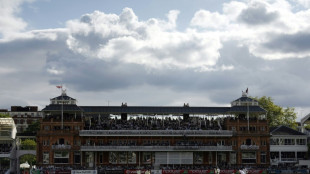 2026 T20 World Cup 'biggest women's cricket event in England' - ECB
2026 T20 World Cup 'biggest women's cricket event in England' - ECB
-
Bangladesh begins three days of mass political rallies
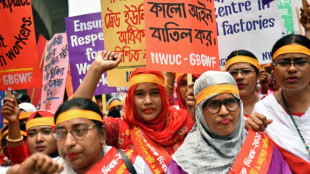
-
 Children learn emergency drills as Kashmir tensions rise
Children learn emergency drills as Kashmir tensions rise
-
Millions of children to suffer from Trump aid cuts
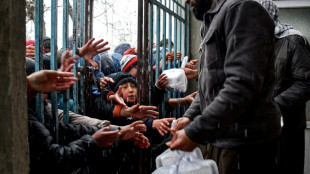
-
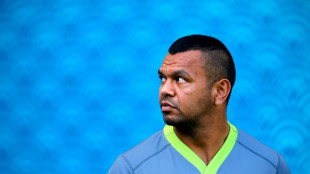 Veteran Wallaby Beale set for long-awaited injury return
Veteran Wallaby Beale set for long-awaited injury return
-
Syria's Druze take up arms to defend their town against Islamists

-
 Tesla sales plunge further in France, down 59% in April
Tesla sales plunge further in France, down 59% in April
-
US calls on India and Pakistan to 'de-escalate'

-
 Israel reopens key roads as firefighters battle blaze
Israel reopens key roads as firefighters battle blaze
-
Europe far-right surge masks divisions

-
 James will mull NBA future after Lakers playoff exit
James will mull NBA future after Lakers playoff exit
-
Ukraine's chief rabbi sings plea to Trump to side with Kyiv

-
 Australian mushroom meal victim 'hunched' in pain, court hears
Australian mushroom meal victim 'hunched' in pain, court hears
-
Lakers dumped out of playoffs by Wolves, Rockets rout Warriors

-
 Booming tourism and climate change threaten Albania's coast
Booming tourism and climate change threaten Albania's coast
-
US reaching out to China for tariff talks: Beijing state media

-
 Tariffs prompt Bank of Japan to lower growth forecasts
Tariffs prompt Bank of Japan to lower growth forecasts
-
Kiss faces little time to set Wallabies on path to home World Cup glory

-
 Serbian students, unions join forces for anti-corruption protest
Serbian students, unions join forces for anti-corruption protest
-
Slow and easily beaten -- Messi's Miami project risks global embarrassment

-
 Fan in hospital after falling to field at Pirates game
Fan in hospital after falling to field at Pirates game
-
Nuclear power sparks Australian election battle

-
 Tokyo stocks rise as BoJ holds rates steady
Tokyo stocks rise as BoJ holds rates steady
-
Bank of Japan holds rates, lowers growth forecasts

-
 'Sleeping giants' Bordeaux-Begles awaken before Champions Cup semis
'Sleeping giants' Bordeaux-Begles awaken before Champions Cup semis
-
Napoli eye Scudetto as Inter hope for post-Barca bounce-back

-
 Germany's 'absolutely insane' second tier rivalling Europe's best
Germany's 'absolutely insane' second tier rivalling Europe's best
-
PSG minds on Arsenal return as French clubs scrap for Champions League places

-
 UK WWII veteran remembers joy of war's end, 80 years on
UK WWII veteran remembers joy of war's end, 80 years on
-
Myanmar junta lets post-quake truce expire

-
 Rockets romp past Warriors to extend NBA playoff series
Rockets romp past Warriors to extend NBA playoff series
-
Messi, Inter Miami CONCACAF Cup dream over as Vancouver advance

-
 UN body warns over Trump's deep-sea mining order
UN body warns over Trump's deep-sea mining order
-
UK local elections test big two parties

-
 US judge says Apple defied order in App Store case
US judge says Apple defied order in App Store case
-
Seventeen years later, Brood XIV cicadas emerge in US

-
 Scorching 1,500m return for Olympic great Ledecky in Florida
Scorching 1,500m return for Olympic great Ledecky in Florida
-
Israel's Netanyahu warns wildfires could reach Jerusalem

-
 Istanbul lockdown aims to prevent May Day marches
Istanbul lockdown aims to prevent May Day marches
-
Moderna Reports First Quarter 2025 Financial Results and Provides Business Updates

-
 DEA Unconstitutional Marijuana Hearing - MMJ to File Emergency Injunction and Suit for Irreparable Harm
DEA Unconstitutional Marijuana Hearing - MMJ to File Emergency Injunction and Suit for Irreparable Harm
-
Formation Metals Announces Appointment of Adrian Smith to Advisory Committee

-
 Cerrado Gold Announces Q4 And Annual 2024 Financial Results
Cerrado Gold Announces Q4 And Annual 2024 Financial Results
-
Australian guard Daniels of Hawks named NBA's most improved

-
 Mexico City to host F1 races until 2028
Mexico City to host F1 races until 2028
-
Morales vows no surrender in bid to reclaim Bolivian presidency
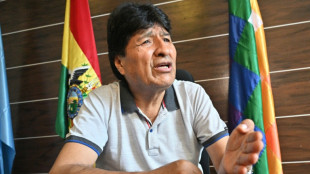
-
 Ukraine, US sign minerals deal, tying Trump to Kyiv
Ukraine, US sign minerals deal, tying Trump to Kyiv
-
Phenomenons like Yamal born every 50 years: Inter's Inzaghi


IMF's Gopinath says time to 'recalibrate' Covid restrictions
China should begin to "recalibrate" its aggressive anti-Covid policy as other countries are doing, to try to ease the negative impact the pandemic continues to have on global supply chains and economic growth, a senior IMF official said on Tuesday.
Speaking in an interview with AFP, Gita Gopinath, the newly-installed number two official at the global crisis lender, said with vaccines and treatments countries should be able to get back to more normal activity.
-Is it time for China time to ease its zero tolerance policy?
"Firstly, I would like to recognize that the zero COVID strategy for China has worked very well in 2020 and 2021. They've had very low cases, very few deaths, and the economy has been recovering. So it's a strategy that has worked well...
"Like all countries, they will indeed need to recalibrate because what we are seeing is with more frequent outbreaks, and therefore more lockdowns, even though they're very targeted, we're certainly seeing that having a negative impact on activity. And if that becomes much more serious, it will not just slow down growth even more but also have very important consequences for global supply chains.
"So we are moving I would say gradually to that recognition, that because of the vaccines that we have, the tests, the therapeutics, we can get back to much more normalcy."
-How do you view the inflation risk in the US economy?
"Inflation has become elevated pretty much across the globe. And especially if you look at headline inflation, that's been very high in many countries, because we've seen a big increase in energy prices and food prices.
"The US is an example of that, where inflation is quite a bit broad-based, and you're seeing it including in wages rising.
"Our projection is that inflation in most countries will decline through this year, especially in the second half of this year. And then into 2023 is when we will see it subsiding. But we should recognize for several countries, that inflation even though it's declining, it will be high. It will be above their targets.
"I would just recognize the high level of uncertainty around inflation projections. Because inflation this time round is not just a simple macro story, but has all very pandemic specific elements to it...
"From our perspective, the more likely scenario is that it will not be down to two percent (in the United States) by the end of this year, in fact, it will be quite a bit above it ... It will take going into 2023 for that to come down further."
-What is the risk of higher interest rates?
"This is going to be a challenge for central bankers this year to be able to communicate the transition to tighter monetary policy. And they should handle that with care. Because we are in a world with very high levels of debt (and) if interest rates really jump up in an unexpected way, then that can hit several countries quite negatively.
"We are concerned about the high debt levels, and importantly, the high levels of debt servicing costs many low income countries have to pay. We have 60 percent of low income countries that we assessed to be either already in debt distress or in high risk of being in debt distress.
"So these are very difficult times. And as global interest rates are going up, it's going to be a big fiscal cost of them."
J.Oliveira--AMWN